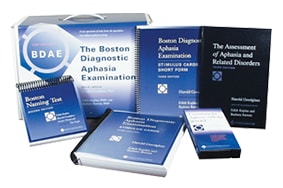The Boston Diagnostic Aphasia Examination, Third Edition (BDAE-3) is a complete resource for communication modalities, including new testing options for the Boston Naming Test, Second Edition (BNT-2), methods for eliciting discourse, and new approaches to scoring and new tests for analyzing reading disorders.
- Gain critical insight into your client’s functioning by using this practical, individually administered test.
- Use BDAE-3 with the BNT-2 detect mild word-retrieval deficits.
- The new BDAE-3 short form of this authoritative testing instrument provides you rapid access to diagnostic classification and quantitative assessment.
- The regular exam, based on recent research in neurolinguistics, enables you to probe more deeply into your client’s use of language.
The BNT-2, as simply a component of the BDAE-3, is a measure of visual confrontation naming. BNT-2 normative data are listed in the back of the protocol. Specifically, the data are means and standard deviation of the normative sample. The BNT-2 was normed on 210 cognitively intact adults, ages 18-79. The directions for the administration are located right inside the Short Form Stimulus Cards Picture Book.
The scoring is done on page 9 of the protocol, but it doesn’t provide standard scores or percentiles. The examiner completes the Summary of Scores and inserts them in to the Summary Profile of Standard Subtests in the BDAE-3 Record Booklet to get percentiles. The percentiles are listed as 0, 10, 20, 30, 40, 50, 60, 70, 80, 90, and 100 only. The scores that are collected are a tally of the number of correct responses, the number of cues given, number of phonemic cues, and more.


